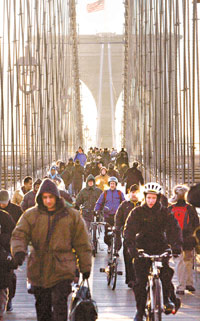|
Transit worker strike brings NYC to a halt
(AP)
Updated: 2005-12-21 13:58
NEW YORK - Commuters trudged through the freezing cold, rode bicycles and
shared cabs Tuesday as New York's bus and subway workers went on strike for the
first time in more than 25 years and stranded millions of riders at the height
of the Christmas rush. A judge slapped the union with a $1 million-a-day fine.

Commuters cross the
Brooklyn Bridge on foot and bicycle during the morning rush-hour Monday in
New York City. [AFP] | The sanction was levied
against the Transport Workers Union for violating a state law that bars public
employees from going on strike. The city and state had asked that the union be
hit with a "very potent fine."
"This is a very, very sad day in the history of labor relations for New York
City," State Justice Theodore Jones said in imposing the fine.
The union said it would immediately appeal, calling the penalty excessive.
The strike over wages and pensions came just five days before Christmas, at a
time when the city is especially busy with shoppers and tourists.
The heavy penalty could force the union off the picket lines and back on the
job. Under the law, the union's 33,000 members will also lose two days' pay for
every day they are on strike, and they could also be thrown in jail.
The courtroom drama came midway through a day in which the walkout fell far
short of the all-out chaos that many had feared. With special traffic rules in
place, the morning rush came and went without monumental gridlock. Manhattan
streets were unusually quiet; some commuters just stayed home.
The nation's biggest mass-transit system ground to a halt after 3 a.m., when
the union called the strike after a late round of negotiations with the
Metropolitan Transportation Authority broke down. The subways and buses provide
more than 7 million rides per day.
New Yorkers car-pooled, shared taxis, rode bicycles, roller-skated or walked
in the freezing cold. Early morning temperatures were in the 20s. Mayor Michael
Bloomberg joined the throngs of people crossing the Brooklyn Bridge by foot.
"Hey, can I get a ride?" Jay Plastino asked a neighbor near his home in the
northern tip of Manhattan. Plastino, who was headed to his midtown job, was
angry at the union: "This is a big city. Don't they realize that?"
By Tuesday's evening rush hour, crowds were thick at both Penn Station and
Grand Central Terminal as commuters waited for trains on the two suburban rail
lines, where ridership had soared earlier in the day. The Long Island Rail Road,
operating out of Penn Station, carried 50,000 more passengers above its usual
100,000.
|